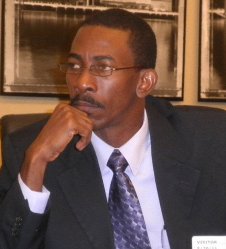By Samuel Sukhnandan
The social development officer attached to Office of the President, Dr Kwame Gilbert is urging government and civil society to work towards redirecting the energies of youth involved in gangs, with the aim of enabling the development of positive behavioural patterns and social change in society.

Dr Gilbert told Guyana Times International last Thursday that while society may seek to reduce the creation of gangs, it must find ways also of engaging existing gangs, with the intention of helping them to bring positive changes for themselves.
Some gangs, he said, already function as normal youth clusters, and are involved in similar activities.
He explained that gangs often provide a space for young people to meet and get involved.
“I suggest that a very good way is to redirect these energies, engaging these gangs and rather than to have them dissolved and young people are left with no place to go – find ways of engaging them to begin to see that they have an opportunity – not to be destructive in their nature and function of their operation, but to begin to work towards creating a safe space for them,” Dr Gilbert posited.
He explained that sport and youth clubs provide the same space for young people that gangs do, but the difference is gangs often develop into a closely-knitted quasi-family. The loyalty that members of these gangs develop binds them to the group and into acquiescing to behaviour that is either deviant or destructive.
By virtue of their own allegiance to the gang, members do whatever is required of them to prove that they are loyal. This often results in destructive behaviour, which leads to destruction of property and life, among other negative results.
Strengthening family unit
“I think if we begin to work more on strengthening the family unit, and engaging our young people at the age where they are often introduced to gang activities – sometime in their early teens, then we will be able to keep them on a safe path,” Dr Gilbert said. He stressed that the community should also play an active role and must start to engage young people in positive activities, pinpointing potential candidates of gangs. The social development officer also noted that the possibility of youths being involved in gangs should be considered from when they are very young, as in many cases, young people are recruited to gangs from schools.
Dr Gilbert reiterated that he firmly believes that when families disintegrate, it usually leads to an increase in gang activities and the destruction of the family unit may be the reasons behind the emergence of youth gangs. The official posited that gangs actually provide an outlet for young men to give expressions to their three basic hungers.
According to him, every young person has three hungers, firstly, a need for an “identity” – this is not only in the context of a family, but in society at large. The next hunger is the need to be loved and valued, and the third is the need to create an impact.
Dr Gilbert believes that the whole issue of how young people dress and what they do is often an attempt to impact society. “Gangs provide that opportunity for young people to give expression to those three hungers they have. So in the absence of a stable family unit, our young people would gravitate towards gangs,” he posited.
The government official said while there is some level of gang activity among Guyanese youths, he believes that it can be reduced.
This, he noted, will require much hard work and dedication on the part of all stakeholders, including government, non-governmental agencies, communities, and religious bodies.



